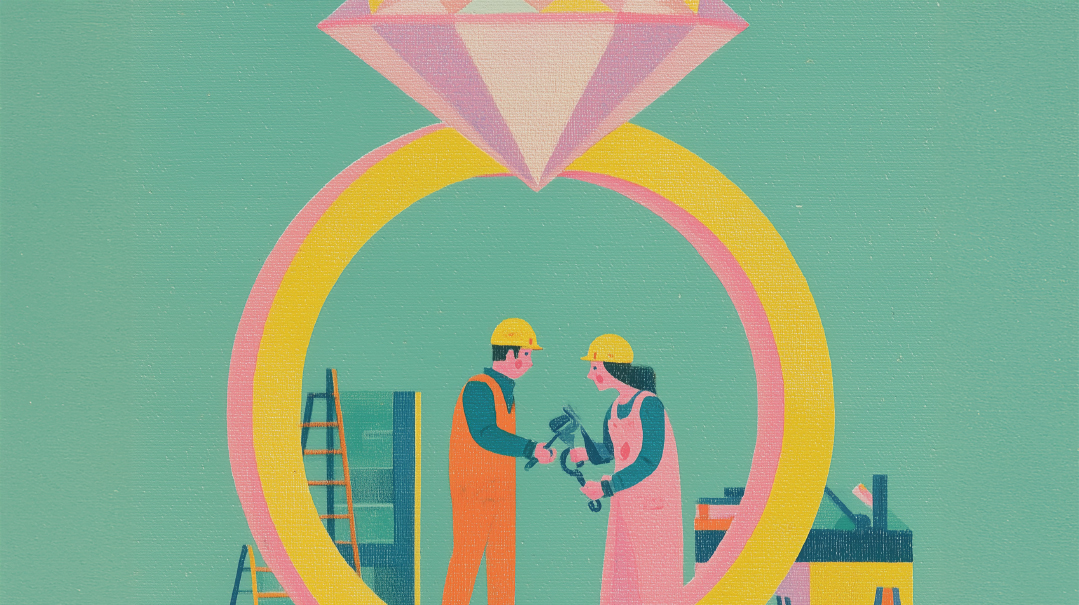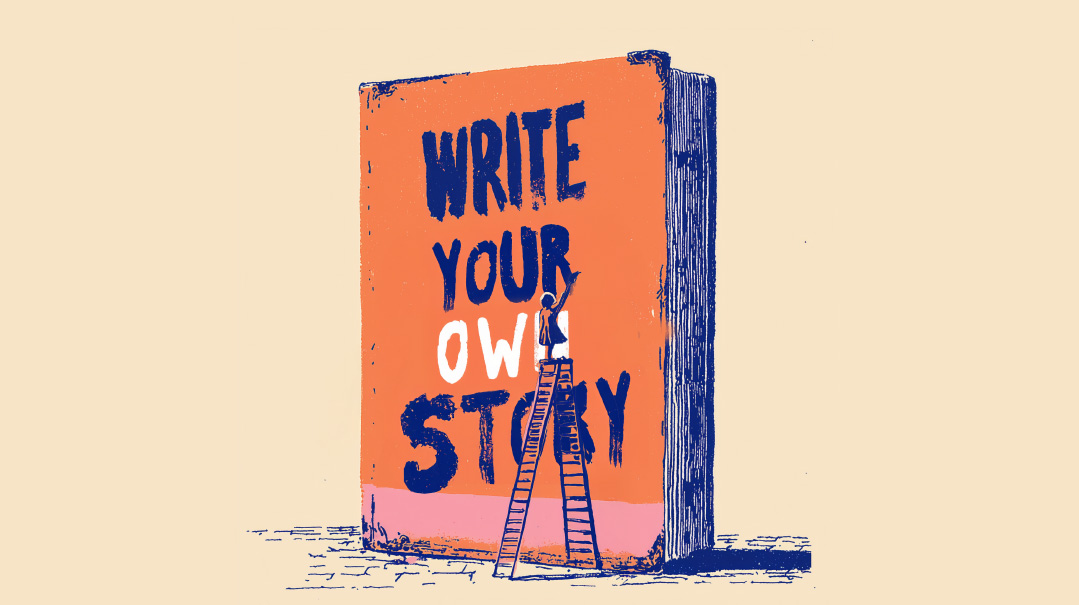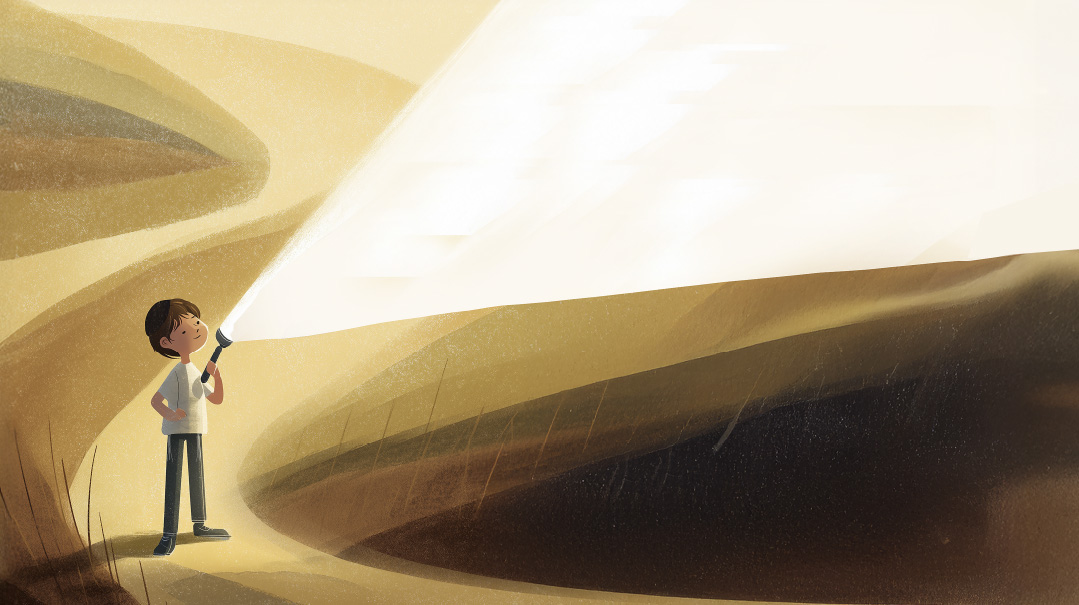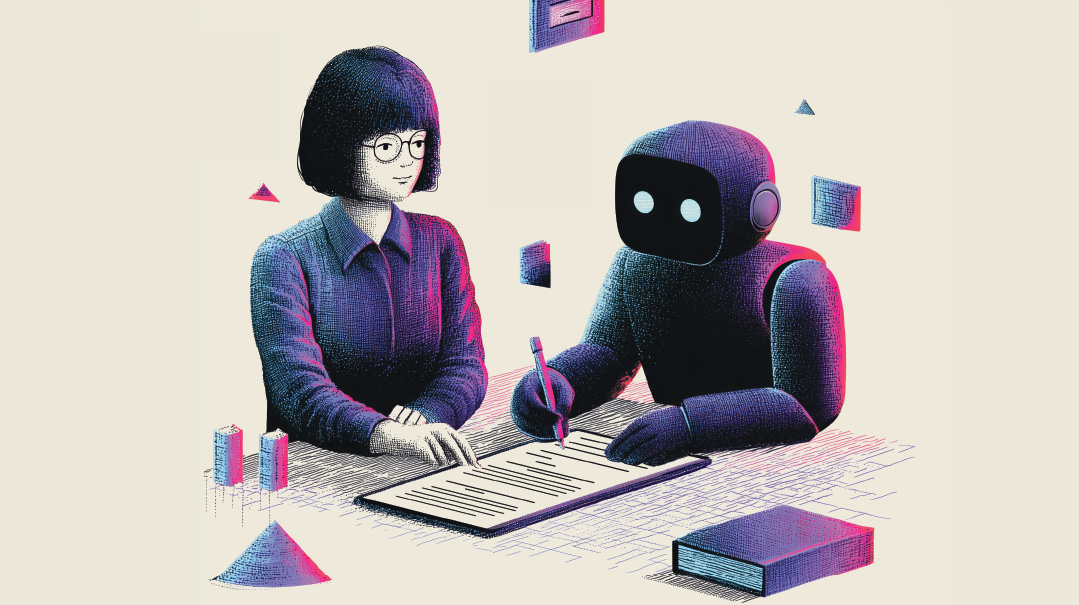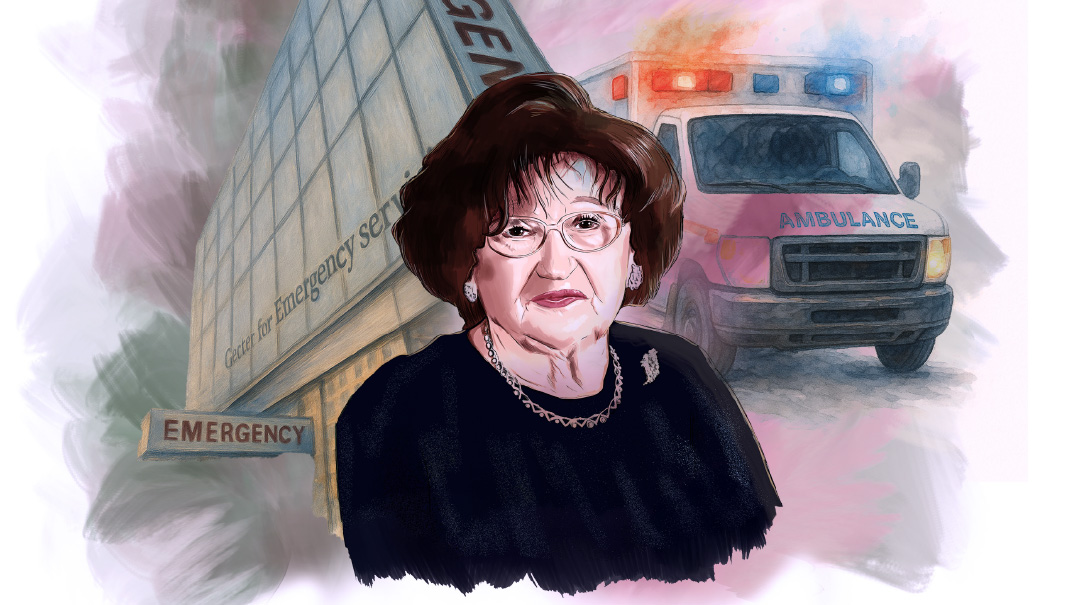Unmasked Faith
| March 4, 2025There was no way she could ever have a baby. But Hashem is not bound by what’s possible
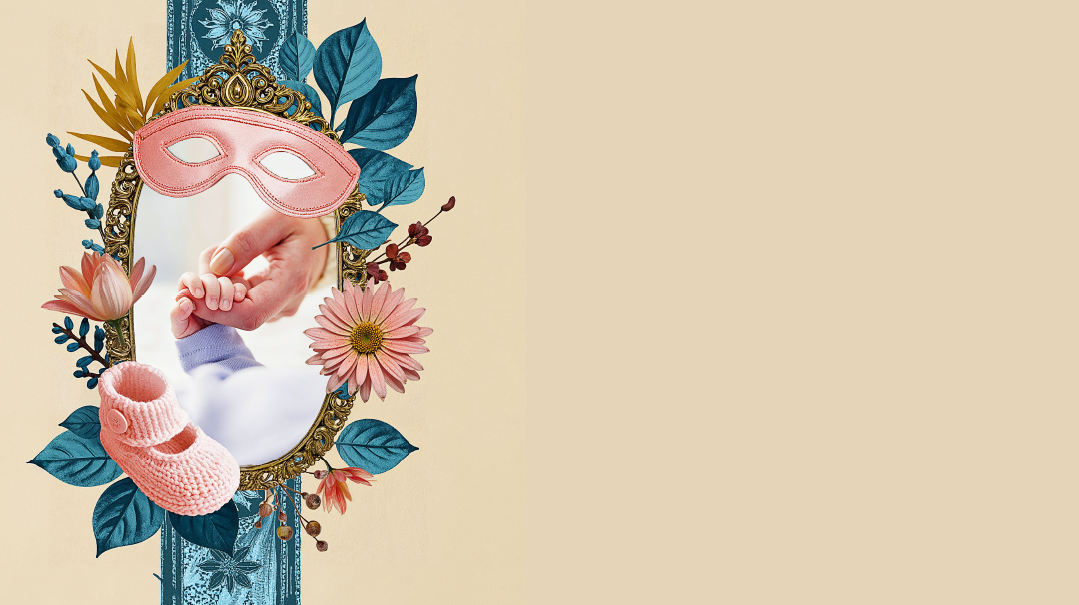
ON
the outside, Ariella Gordon looked like every other seminary girl walking Yerushalayim’s crowded streets. She studied for tests, enjoyed weekly chesed opportunities, went to new communities each Shabbos so she could explore more corners of her beloved land.
No one knew that the girl with the sunny smile was wearing a mask.
That she’d just learned something that would set her on a path very different than the one most of her classmates would walk. For it was during her seminary year that Ariella learned that she had MRKH syndrome. In simple terms, she’d been born without a womb.
Fast forward to today, almost ten years later, when Ariella has courageously shared her story with the world.
“When people marvel at how open I am, I laugh,” she shares. “I’m an introvert and extremely private. For everything I do share, there is so so much I don’t share.”
I can sense this as I listen to her. She’s an outstanding mix of candid authenticity and innate modesty. As someone who knows well the challenge of sharing openly while trying to never cross the line into crass oversharing, I can sense how Ariella tiptoes through the recounting of her story, each word weighed carefully.
Why do this if it demands such a delicate balance?
Because Ariella has a mission, a message for every one of us.
“Very few people are born with MRKH, and even fewer will pursue the treatment I did, but so many of us are wearing a mask, showing the world a carefree surface when we’re struggling mightily.
“Some people may never take off their masks — and that’s fine — but we should all be aware of their existence.
“Be kind. Speak thoughtfully. Treat each other gently.”
Hashem Chose Me
Ariella was in tenth grade when her parents had some health concerns. She went to a doctor who ran several tests to uncover what was going on.
The call to her parents came shortly afterward: Ariella would be unable to bear children.
“My parents did the biggest chesed,” she shares. “They spoke with a rav, and together decided to shield me from the brutal truth so I could have a normal high school experience.
“They simply said that everything looks good for now; when you’re older, we may need to do other tests. One of the many nissim I experienced is that I never pushed, never put the pieces together.
“I believe Hashem only lets us discover things when we have the capacity to carry them. I wasn’t ready then. My parents have more strength than I’ll ever know. I’m only beginning to understand what it’s like to be a parent, and I can’t imagine what it must have been like to carry this pain for me.
“Particularly since, at that point, it was a bleak diagnosis — the doctors said, ‘Your daughter will never have children,’ with such finality.”
The years passed, and Ariella went off for a year in the land kissed by Hashem’s constant Presence. Her parents felt that this would be the perfect time to share the reality with her. While they had planned to visit her so they could break the difficult news in person, it didn’t quite work out that way. You could say, “Man plans and G-d laughs,” but Ariella prefers “Man plans and G-d plans better.”
Ariella has no regrets about how it unfolded: “I’m glad I was in Israel when I learned the truth. Until today, most of the great rabbanim we consult with and the mentors we lean on are based in Israel.”
What was it like to learn such life-altering information?
“It felt intensely private. I didn’t feel shame or embarrassment — I know others do, and it’s totally normal — but to me, it felt like this was privileged information, and there were very few people I wanted to share it with.”
For years, the only people who knew were Ariella’s parents, a small handful of friends, and rabbanim and mentors.
Ariella admits that the impact of her diagnosis came at her in waves. “The first thing that hit me wasn’t kids, but shidduchim. It felt so unfair. Like, hard enough that I have this issue with fertility, was I also not going to be able to get a normal shidduch? That’s two for one and felt like a lot.
“Some rabbanim would say, ‘You’ll have a wonderful life. You’ll marry a widower with a few small children and you’ll raise them, being their mother in every way.’ But to an 18-year-old just out of seminary, this wasn’t comforting. If felt overwhelming to consider walking into a family and raising orphans.
“I know there are others who do gain a family that way, and they find it a beautiful privilege — and it is — but my neshamah seemed to sense that this wasn’t my tafkid.”
I marvel at the equanimity she exudes. “You were okay with this? There was no anger? No ‘why me?’ ” I push. “Are you just naturally angelic?”
She laughs. “I was never angry at Hashem,” she says. “I actually felt unique and special.
“I visualize this sort of cosmic conveyor belt in a ‘factory’ where Hashem is putting together the bodies He is about to dispatch to Earth.
“It would have been so easy for Him to create me like nearly every other woman on the planet. It’s almost like it takes more effort for Him to ‘leave something out.’ Hashem singled me out for a unique tafkid.”
A long pause. “There were some ‘why me’ moments,” she admits, “but they were due to the ‘accessories of the nisayon’ — people’s comments.
“During the years I should have been in shidduchim, people would say things like, ‘Wow, Ariella is so perfect! She’ll get snatched up right away!’
“And my parents and I would be cringing, thinking, please, please just be quiet.”
Splitting the Sea
Ariella got back from seminary in 2016. She was busy — pursuing a degree, traveling, doing research programs. But shidduchim loomed in the background.
“People would make suggestions and we’d have to say I was busy, again and again, even though I had never dated a single boy. It was hard.”
Finally, she decided to embark on shidduchim. With guidance from her rabbanim, she knew that when she hit what felt like the midpoint between first date and engagement, it would be time to share her most privileged information.
Then Covid hit, and dating migrated to Zoom. “I was relieved,” she admits. “The screen gave me a touch of protection from what I assumed would be the inevitable deluge of rejections.
“I’d wonder aloud: How many times would I have to be rejected before someone finally agreed to my unusual package? 100? 1,000? I braced myself.”
The first few boys she met were not a match, so she never had to share her secret. Then, Corey Kamen was suggested — from an unlikely shadchan.
“Between semesters, I traveled to Israel, and there I trained as a first responder through Magen David Adom. We were a very eclectic group.
“Several Canadians who fell along the religious spectrum were in my cohort. They were planning a Shabbat meal and they asked me for a Torah thought they could share.
“I send out a short devar Torah each week, so I forwarded one to them. Afterward, they remained on my list. Occasionally, one of them would respond with a ‘thanks,’ or ‘Shabbat Shalom.’
“One day, one of them asked if I was dating. ‘I have a great guy for you,’ he enthused. ‘He’s the most amazing guy and you’re the most amazing girl.’ And I couldn’t help but wonder: Are he and I the only religious people you know?
“He sent me details, and it turned out that the boy and I were in the same medical school, although we’d never met because classes were remote. I wasn’t excited about dating a classmate — it could get awkward if it didn’t work out, but the information we got was promising, and we decided to date over Zoom.”
After just a few dates, Ariella felt Corey was someone she could trust. He also had a healthy sense of perspective. “We were talking about some of the classes and laughed about how stressed some of our classmates were getting because they couldn’t find the exact edition of the textbook the professor preferred.
“He understood that there are real challenges in life — far bigger than the wrong textbook.”
Ariella has a beautiful bracelet with a single word: Warrior.
“I was wondering if I should take it off before we dated, but my mother said, ‘you’re doing this over Zoom, he won’t notice, or he’ll think it’s your name.’ But Corey was observant.
“‘What does your bracelet say?’ he asked me.
“I said something generic, like we’re all warriors in our own way. Then I added, ‘Obviously there’s more to it, but I’m not really ready to share yet.’ So I was already dropping hints.”
As they continued to date, the stakes rose. “I actually tried breaking up with him a few times,” Ariella admits. “I was getting scared and wanted to drop him before he’d drop me, so I made big deals out of some little things.”
But they weathered the storms and after a month, it was time to share the truth. “I told him that I had something serious I needed to tell him on our next date. He had no idea what was coming, but knew it wouldn’t be a fun, light date.
“When you need to share something huge with the person you’re dating, so much depends on how you view it.
“If you feel like your issue is a huge burden, and have the sense of, I’m a nebach, why would you want to marry me, others will pick up on that.
“If this diagnosis is your whole being, then yes, why should someone want it?
“But if you have a broader perspective, if you know that you’re a wonderful, interesting person with many gifts, and yes, you also have this genetic/biological difference, then that’s what will be transmitted when you share the information.”
I marvel at her confidence.
“Oh, that’s not to say I wasn’t terrified! I could barely breathe. I still have the sweatshirt I was wearing on that pivotal date. I can’t throw it out; it’s a part of our joint history.
“I started by saying, ‘Okay, I’m going to share something with you, and you can hang up right away. Take your time, and call me back — or don’t call me back.’ I was trying to protect myself as much as possible.
“Then I calmly explained my reality to him, explaining the science of the condition. If things come naturally, we don’t realize how many thousands of blessings and miracles are involved, but if something is amiss, all these details are significant.
“I outlined the different routes people with my condition can go to have children and mentioned that there was this very new treatment that sounded like science fiction, uterine transplant.”
“How did Corey respond?” I ask, suddenly aware that I’m holding my breath, imagining the tension of the date.
“I don’t remember exactly what he said, but I do remember that he stayed on the call. That, in and of itself, was so huge.
“We spoke about my condition for a while and then moved on to other things. He had to think and process, make phone calls and speak to his rabbanim, but that initial response was so heartwarming. And after we hung up, he sent me a beautiful text, thanking me and telling me how privileged he felt that I shared this.”
After Ariella’s revelation, Corey shared that his grandmother had been diagnosed with lupus while she was engaged. In those days, it was a serious condition; the doctor gave her six months to live.
“His grandfather said, ‘I’m not going to end our relationship. If you only have six months, it will be the best six months of our lives.’ She lived 22 more years, and they had three children together, one of whom was Corey’s mother.
“That story, part of his family legacy, made a big impression on Corey, and impacted how he approached my revelation.
“He realized that often, when dating, we’re looking for that perfect person — but perfection doesn’t exist in this world. We all have challenges; it’s how we react to them that makes all the difference.”
A month later, Corey and Ariella were ready to meet in person. Which wasn’t as easy as it sounded — another outbreak of Covid had shut down airports, and Corey was in Israel and Ariella in Miami.
After much effort and a couple of canceled bookings, Corey finally managed to get on a flight and made it to Miami. Two weeks later, they were engaged.
Starting the Journey
Ariella and Corey were excitedly planning both a wedding and their move to Israel, where they would be resuming their studies in person. But in addition to worrying about bands and apartments, the chassan and kallah needed to make medical decisions. There was a procedure they would have to undergo if they wanted to get listed as potential transplant recipients.
“We could have done the procedure in Israel, but it isn’t an easy procedure and I felt like I needed to have family support.”
After a joyous wedding and sheva brachos, and a few months of the blessed normalcy of newlywed life, the Kamens headed to New York, where they prepared for the procedure.
“It was tough,” Ariella admits. “As Corey later shared: At three months married, you should be getting your wife’s coffee order straight, not supporting her through injections. Yes, it strengthened our marriage, but it was really hard.
“We still didn’t know each other’s communication styles, and struggled to express our needs. And this wasn’t about socks on the floor. I had some complications after the procedure and was hospitalized.
“I had to lean on my parents a lot, which is hard when you’re trying to build this new marital unit of you and your husband.”
Ariella and Corey spent Succos with her family, then flew to Israel. Before they left, they filled out forms showing an initial interest in several uterine transplant programs. Most of the programs were clinical trials and were full. But one suggested they try UAB where they had just opened a program.
“I remember googling it,” Ariella says. “The University of Alabama was in Birmingham. I knew Alabama was a state because I had to memorize all fifty in school, but I didn’t even know where it was.”
The medical team at UAB set up a Zoom call with the Kamens to see if they might be good candidates.
“We had neighbors across the hall we were friends with, but the walls were thin and I remember being afraid,” Ariella shares. “I wanted to set up the Zoom call in the dining room, but then panicked that maybe they’d be able to hear the conversation through the walls.
“I was living this double life, on the surface a newlywed couple in medical school in Eretz Yisrael, but in reality, needing to make life-altering decisions.”
The call, done with the transplant team’s surgeon and nurse was overwhelming. “It was kind of like the conversation you have with a potential ger. They tell you lots of scary statistics and potential complications. And only then do you get to the wonderful part: Oh, and after all that, you can try to have a baby.”
One call was followed by another, and the team then invited the Kamens to the hospital to be interviewed in person. This was a serious crossroads.
“It’s really hard when you have two dreams pitted against each other. We both wanted to finish school — and we knew that moving to Birmingham would shelve that dream for a while. Yet we were also afraid that if we waited, the wait list at UAB may get prohibitively long. We ultimately realized that there’s never really a perfect time to put your life on hold.
“We went to the dean of our school and explained the opportunity. We also spoke with rabbanim and mentors and got guidance to try to pursue this, despite not knowing if it would work out.”
The Kamens went back to Miami for Purim and then told friends that they were going on a road trip. “We’re just going to drive,” they shared with a laugh. “We don’t even know where we’ll end up.” Which wasn’t quite accurate; they were headed straight for Birmingham.
The evaluation consisted of a lot of bloodwork, and then, over three grueling days, the couple met with a surgeon, a social worker, a nutritionist, a psychiatrist, an OB, and a reproductive endocrinologist. Then they drove back while the team met to discuss their case.
Just before Pesach they got the call: They were accepted to the program.
A Strange Land
Pesach passed, and it was time to move far away from all that was beloved and familiar. “It was hard to know what to tell people. Corey is more open than me, and he would have shared the truth, but I wasn’t ready.
“We told family that we were moving for medical reasons, but even my siblings didn’t know about my diagnosis. I remember googling, ‘Why would someone move to UAB for medical reasons’ to make sure it wouldn’t pop up if someone would go hunting.”
They moved in June, and by July they were listed with UNOS (United Network for Organ Sharing), the organization that manages the nation’s organ donation and transplant system.
A couple months later, Ariella decided it was time to share.
She penned the following before posting about the unique nisayon she was facing:
Walls might keep the danger out, but they keep the pain in.
I’ve been dreaming of this letter for years now. I’ve spent so many hours dreaming; it’s hard to know when I’m asleep and when I’m awake.
I’ve always thought I would wait for the “right time” to share my story with everyone — but the older I get, and the further along I am on my journey, the more I realize that there is no “right time.”
Sharing this will never feel “right” and I will never feel truly ready.
But the thing is, I’ve been hurting. And I’m tired of feeling hurt.
My hope with sharing is that I will get hurt less often and that people can be sensitive and respectful of our privacy.
I know that I will still get hurt.
It is inevitable.
But I hope that this will help.
A little.
At least.
And for others.
Who are not yet at the stage that I’m now at.
Where the pain inside the walls is worse than what is outside.
And so, I’m breaking the wall.
The outpouring of love and support that she got in response gave her comfort. It also became part of a mission: The desire to sensitize others to the silent pain many of us carry.
“When someone is going through something painful that isn’t on display — or is on display but isn’t fully grasped — the nisayon is hard enough, we don’t need ‘accessory pain.’
“One thing I learned over the years is that most people really do mean well, but even casual comments can cause pain.
“For example, I have trouble with, ‘How are you?’ A lot of times, I’m not ready to tell you how I am, so I’ll just lie or fall back on the classic, ‘Baruch Hashem.’
“Instead of asking, ‘How are you?’ you can just say something like, ‘Hope your day is going well,’ or offer a smile and ‘It’s so nice to see you.’
“It’s impossible to always get it right, but before asking a question, think for one second: What am I essentially asking?
“If you ask me, ‘How are treatments going?’ you’re requesting that I share intensely personal information.
“It’s sad to go to shul and have to worry about who you’ll meet and what they’ll say, particularly because shuls should be a safe place. Those that are not yet married shouldn’t be asked about their dating lives, and no one should be scanning the stomachs of those not yet blessed with children. Keep conversations friendly and noninvasive.”
The Wait
Waiting is amorphous — endless hours between one step and the next. And yet, as anyone who has ever waited for something knows, it has an energy of its own, a murky, tense weight.
“We were told that the call informing us of a donor could come at any time,” Ariella shares. “It could be five days, five months, five years. We had to be in Birmingham at all times.”
Since uterine transplant is so new, it’s not automatically included when someone agrees to be an organ donor. Special permission must be granted by the family, an additional step that brings more uncertainty into the process.
“It’s lonely. I’m from Miami and Corey is from Toronto — both large Jewish communities. The Chabad of Alabama is wonderful, but the community is tiny.
“One of the hardest parts of being here is the distance from family. There’s a lot of isolation. You can’t just drop into your mother for supper or go out with friends. Plus, I feel like few people here know the real me, they’ve only seen me in a delicate medical situation.”
Here’s what Ariella wrote during those long, lonely months:
It’s all so much.
Too much?
I feel like it would be easier to hit pause if there were a start button in sight.
There are times when everything feels overwhelming, and I wish I could hit pause to my pause. Where I can go back to “normal life.” Where I can be back in school. Where I can be in control of my schedule. Where I didn’t need permission to vacation.
I wish I could make summer plans. Maybe even have people come visit.
But no. Because everything is so up in the air. Dangling.
I know Hashem is dangling it all so I’m not worried. I know it’s all going to be ok. I just wish I could sneak a peek up there.
I know I can’t. But I can still wish. Wish that I could press pause on the fertility journey that forced me to press pause on my life in so many ways.
The Call
It was Shabbos parshas Lech Lecha, 2022. That Friday night, Corey and Ariella spoke about the parshah, and about their own lech lecha, following Hashem into the unknown, bolstered only by their faith.
Early the next morning, Ariella was sleeping when her phone rang.
“I had played out the moment of The Call in my head so many times. But what actually happened didn’t match any of my many imaginary versions.
“I had changed the ringtone for the nurse, according to the detailed psakim we got from our rabbanim. That Shabbos morning, I heard the call through the fuzz of sleep, and it took a moment until I registered that it was that ring tone.
“I answered and she gave me all the information. I threw on an outfit and sneakers and ran all the way to shul. I saw one of the rabbanim and asked him to call Corey, and tell him to meet me in the rav’s office.
“Corey came out and we discussed the offer, the organ, and the donor. We let the hospital know we were accepting it. They told us it would take a while until anything would happen.
“We spent the rest of Shabbos in taut anticipation, calling for an update as soon as Shabbos was over. They told us I’d only need to come in the following day.
Hope Transplanted
On Monday, the moment they’d been waiting for finally happened. Ariella was taken into surgery, and emerged with a uterus. It was the week of parshas Vayeira, when Hashem remembers a barren Sarah Imeinu, a woman born with no uterus, and gives her a child.
“No matter what they tell you, nothing can prepare you for how you’ll feel posttransplant. It’s like being hit by a train, so many symptoms going from 0 to 100 in a few hours.
“The uterus is foreign, and naturally the body will fight it. I need weekly blood tests and monthly biopsies. I also have to be on a lot of antirejection medications (I take approximately 20 pills daily). The meds make me immunocompromised, so I’ve needed to mask well after COVID. Some people have made snide jokes, and that hurts.”
All this puts a strain on the best of marriages. “Corey has had to take on so many roles, particularly since we’re alone here,” says Ariella. “Good relationships take work. They need to be underlaid with love, compassion, and understanding.
“We’ve had to learn not to over-rely on each other, while still needing each other so much. Being vulnerable is huge — be willing to let your spouse see you in all your states. Communication is also crucial; let them know how they can help you and find out how you can help them.”
Hashem Answers
A transplant does not equal a baby. Ariella and Corey learned this through the long, challenging year (plus) that followed. And then, finally, Ariella was expecting.
“We didn’t share the pregnancy with most people — even our family, we only told them close to the end — because the situation was so complex and miraculous. We wanted to keep it under wraps, although we agreed that if and when we were holding our miracle, we would shout it from the rooftops.”
The little miracle made her appearance on 6 Tishrei, in a blessedly uneventful birth. No one at the birth aside from the doctor knew that Ariella had undergone a uterine transplant. Their daughter was slightly premature but fully healthy, and didn’t even need a stay in the NICU. They named her Eliana Emunah. Eliana — Hashem answers, and Emunah — faith.
“I wasn’t sure if I’d add that second name, but I couldn’t sleep the night before we named her. When I woke up, I called Corey, who was on his way to shul, and said — it’s both.”
A piece she wrote a short while later gave voice to the sentiments behind the name:
We pray. We hope. We dream.
That’s our part.
We ask.
Hashem answers. He always answers.
אליענה. Eliana. G-d answers.
Hashem always answers.
We hope that it lines up with what we want.
We hope that His answer is yes.
Sometimes it’s a yes.
Sometimes it’s a not yet.
Sometimes, and this can feel devastating, it’s a no — and I wish you could understand why it’s not right for you.
That’s where the emunah, the faith, steps in.
Whether or not we get the answer we are looking for, what is constant is our faith. Our belief in Hashem and His tremendous and miraculous abilities.
Always on a Journey
While Ariella had had a remarkably smooth pregnancy, she suffered from postpartum preeclampsia and her body took a while to stabilize.
“People think oh wow, she got her happy ending, so now her life is perfect,” she shares, “but no one’s life is perfect, and our nisyanos keep evolving.
“We made it to this incredible stage of our life, but it’s tricky. In addition to the usual adjustment every new parent deals with, we’re far from our families — I need to stay in Birmingham to be close to the hospital — and I’m still in a difficult medical condition.
I marvel at how upbeat she is. “What are my options?” she asks wryly. “I wrote this line after seminary: We are only hopeless if we lose hope. It’s a miserable world if we don’t have hope or faith.
“Plus, you can’t choose sides when it’s convenient. Hashem is always with me. I can’t be grateful for that when things are working out and then upset when they’re not.
“There have been some very difficult and trying moments along the journey. At those times, I remind myself that the same Hashem who put this difficulty in my path also allowed for uterine transplants; He literally makes the impossible possible.”
What’s her message to those still in the sludgy gray of an endless wait?
“I feel you, I know how painful it is; having emunah is one of the most difficult things. If it’s not difficult, you’re probably not doing it right. A relationship with G-d can be challenging. That’s okay.
“I pray that the people in your support system can have hope for you; sometimes it’s too hard to carry everything yourself, and you need others to be hopeful for you.
“And I only hope and pray that in hearing my story, you’ll realize that Hashem really can perform miracles. That no is hopefully a not yet. That salvation can come in the blink of an eye.
“Sometimes miracles feel so distant — Hashem splitting the sea or saving our nation from a genocidal king in Persia — but He does them in our times, too.”
Ariella Kamen can be contacted through Family First.
Seen, Heard, Supported
“We’re all meaningful people. We’re all going through something and deserve to be treated kindly and with sensitivity,” says Ariella.
“I know what it’s like to carry something so private, to live a double life with no one knowing what I’m going through. It can be very suffocating behind that mask.”
“In addition to the secrecy that sometimes shrouds these challenges, there’s also grief, mourning the loss of dreams, of what you thought your life would look like.”
To address the pain of all those with invisible burdens, Ariella began an initiative on Instagram called HMHO — Help Me, Help Others.
“Every week, one member shares the nisayon they’re currently facing. It could be fertility, shidduchim, struggles with parnassah or children — anything, really.
The story is shared anonymously, and over the next 24 hours, group members respond with heartfelt messages of solidarity and support. “There isn’t a problem to fix. There’s a person to support.”
Ariella gathers these messages and sends them to the nominee who shared their story. She then has the option to add their name to the HMHO Tehillim list.
The feedback from the recipients of the beautiful messages is awe-inspiring. They describe it as “a lifeline,” “what’s keeping me afloat,” and “the most heartwarming thing on the internet.”
“HMHO gave me the ability to believe that I deserve good,” one wrote.
In addition to the support it provides to those receiving the messages, every member benefits from the reminder that behind the glossy surface, so many of us are carrying unseen burdens. And with that realization we can be kinder to others — and to ourselves.
When Medicine Meets Miracles
MRKH syndrome, named after the four physicians who described it — Mayer, Rokitansky, Küster, and Hauser — affects approximately one in 5,000 females at birth. While these individuals have normal female chromosomes and functioning ovaries, they don’t have a uterus.
The journey toward uterine transplantation spans more than two decades, with the first successful birth occurring in Sweden in 2014.
More than 100 uterine transplant procedures have been performed worldwide, resulting in over 70 live births. In the United States alone, 33 live births have occurred following 48 transplants, and the numbers are growing rapidly. The success rate is remarkable — among recipients with viable grafts at one year, 83 percent achieved at least one live birth.
A particularly encouraging milestone occurred when several women successfully carried two pregnancies with their transplant. Current medical protocols allow transplant recipients to carry up to two pregnancies, after which the uterus is removed. The transplanted organ typically functions for about five years. The procedure requires careful donor screening and ongoing immunosuppressant medication.
While uterine transplantation remains classified as experimental in many countries, the procedure has demonstrated impressive success rates, with one-year graft survival at 74 percent and no reported congenital abnormalities in the children born through this procedure. It offers beautiful opportunities to those who, until recently, had no way to carry a child.
On Masks and Masking
Masks play such a central role in my life. It seems as though they are everywhere. What used to be associated with masquerades and Purim fun evolved into an item associated with a global pandemic. Something that somehow warranted bullying and strange looks. As a transplant recipient I’m once again masked to protect myself (obviously, with Hashem’s help) as my immune system no longer can.
But my mask goes back way farther than my transplant. Or coronavirus. Or Purim. My mask has been on for many years.
I’ve lived a masked life. Protecting myself the pain and longing. Of finding a husband. Of having a family. A glimpse into a bright future.
My mask kept me safe. I kept it on around 99.9 percent of the people in my life. It was easier at the time. The fear of facing the fear was too much.
I knew what I wanted. And what I deserved. But how in the world was I going to get it?! I couldn’t fathom my happy ending.
Until I realized — I didn’t need to.
So I removed my mask. But only to Hashem. I’ll never forget that time I cried. So deeply, in so much pain. To Hashem, to my Father in Heaven, to help me. Because no one else can. I needed Him.
When I reflect on the holiday of Purim, a holiday when many dress up in disguises and masks, I’m reminded of the years when I wore my mask so tightly it hurt. I think of everyone and their masks. Because we all wear them. They just look different.
This Purim, I want to challenge you: Purim is a time when we can breathe, we can take off our masks. Just for Hashem.
Perhaps that’s why simchah is a running theme. There’s no better feeling than allowing the masks to come off. What is so obvious in Megillas Esther is that Hashem is in charge. We are all just pawns in this game of life. Hashem is behind each and every move, and His master plan is mapped out to perfection.
None of the details in the Megillah make sense if we look at it through nature’s lens. But Hashem doesn’t care; He is above any rules.
Look at where I am today, with Hashem’s chesed and rachamim. He makes the impossible possible. Let’s lower our masks and beg Hashem for all the salvations we so desperately need. Let us not be afraid. Let us pray. Let us hold onto our faith. Let us hope. Let us believe in miracles.
Hashem’s abilities have no bounds. Why should our prayers?
(Originally featured in Family First, Issue 934)
Oops! We could not locate your form.


